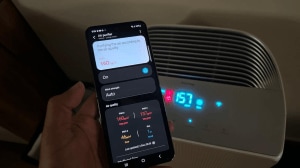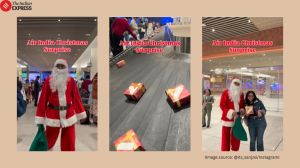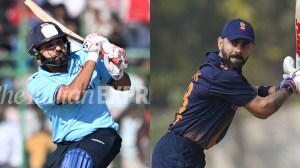Pocket science
Adapting to the changed concepts of education and broadened definitions of the global classroom...
Bringing Singapore Science Centre for children through TV,Vandana Phatak and GopalRao Deokar are exposing children to the practicalities of science through Adbhoot Betachi Safar
Adapting to the changed concepts of education and broadened definitions of the global classroom,city-based teacher Vandana Phatak and Gopalrao Deokar have started a television serial that will expose the students in India to the scientific developments in Singapore Science centre. Titled- Adbhoot Betachi Safar,the serial aired on ETV Marathi on every Sunday morning at 10.30 am,aims to inculcate a practical,scientific and curious approach in the children.
However,a strong emotion and determination backs the venture. I have been working as a teacher for over a decade and while training children on subjects such as Mathematics and Science,I realised that the education system in our country is exam centric and what keeps our children isolated from the practical approach is the lack of hands-on experience. I had come across the information about Singapore Science centre on Internet and in the year 2007,I took a batch of 72 students between class five to 10 for a visit to the Singapore Science Centre. Last year,the number increased to 80, says Vandana Phatak.
While physically visiting the Centre remains the most enriching experience from the point of view of developing a scientific approach,Pathak soon realised that not all parents,though interested can afford to spend as much as Rs 51,000 for sending their children on a seven-day tour.Money should never be a dominant factor in case of education and I felt that the only way to expose maximum children to the programme was by broadcasting the tour on Television, adds Phatak.
The outcome was the serial Adbhoot Betachi Safar with actor Tushar Dalvi,in which the host unveils scientific mysteries of numerous wonders in the nature with an interactive and practical demonstration. From the composition of the smallest conceivable particle of an element- atom to digitalisation and from bioluminescence to DNA,the group of children on the show practically demonstrates the experiments for the viewers. A topic as complicated as Bioluminescence,is handled in an easy way to make it interesing for the viewers. For instance,the children are shown a jelly fish that exhibits the tendency of bioluminescence. The children are told to extract the gene in the fish that is responsible for this phenomenon. They later put it in an enclosed case along with a bacterium. The next day,when they open the case,even the bacterium starts glowing. The concept is understood so well in this manner that no Biology book is needed for guidance, adds Phatak.
The learning is not limited to nature only. In the DNA forensic lab,the students are also encouraged to indulge into CID investigation by giving them blood dots and dummy murderers. They then try to match the DNA and thus find out the real criminal. Touch screen technology,robotics,formation of the dry ice using inert Nitrogen and so on- the students do all the experiments on their own, smiles Phatak.
Going to Singapore Science centre is a dream for children. Tourist agencies do not do it from an educational point of view. With this serial,our dream of exposing children to practical science has partly come to reality. We are now working on developing similar centre in India so that our children do not need to depend on other countries for developing the much needed- scientific approach, concludes she.







